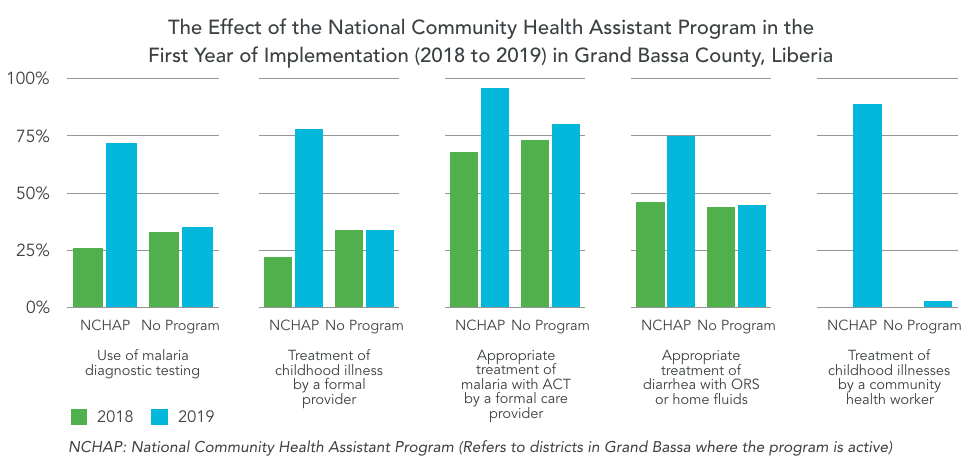Last Mile Health continues to support the Government of Liberia to strengthen the quality of health services provided while shifting to a focus on long-term sustainability as the National Community Health Assistant Program nears full scale. Since the program’s launch in July 2016, more than 3,500 community and frontline health workers have been trained and deployed to deliver a comprehensive package of community-based primary healthcare services to 714,410 people.
Survey Results: Frontline Health Workers Improve Health Outcomes for Mothers and Children
Since 2016, the National Community Health Assistant Program has increased access to care for more than 700,000 Liberians, with community and frontline health workers conducting over 2 million home visits. Recent surveys conducted by Last Mile Health indicate that this program has resulted in incredible increases in treatment for childhood illnesses, preventative vaccination coverage, and maternal care for patients in remote communities.
Following the introduction of the National Community Health Assistant Program in Gboe Ploe District, 75% of children who reported an illness in the two weeks prior received care from a trained health provider in 2018 —more than doubling rates from 2015. Similarly, in Rivercess County, community health workers are now providing care for more than one third of patients requiring medical assistance, a dramatic increase from a mere 2% of cases in 2015.
Treatment of Childhood Illnesses
Expanding access to skilled community and frontline health workers is increasing treatment rates and health outcomes for children under five. In Grand Bassa County, a year-long comparative study between districts implementing the National Community Health Assistant Program and districts where the program has yet to expand found that malaria diagnostic testing, treatment of childhood illness by a health worker, and appropriate treatment of malaria and diarrhea among children under five improved significantly. What’s more, the prevalence of illness among children in Grand Bassa decreased from 70% in 2018 to 49% in 2019 in implementing districts, suggesting overall healthier outcomes for children living in some of the country’s most remote districts. Similar results are reflected in Rivercess County, where more than 90% of children who tested positive for malaria received treatment from a community health worker directly in their community.
Vaccination Coverage
Survey results suggest community and frontline health workers, in partnership with county health teams and health facility staff, are also contributing to increased vaccination rates among children. In Rivercess County, the percentage of children without any vaccine at all (i.e. “zero-dose children”) reduced from 36% to 3% in communities more than 10 kilometers from a health facility between 2015 and 2018. Additionally, the percentage of children receiving all three doses of the pentavalent vaccine, which provides protection for children against five life-threatening diseases—Diphtheria, Pertussis, Tetanus, Hepatitis B and Haemophilus influenzae type B (which causes meningitis and pneumonia)—increased more than threefold between 2015 and 2018 in Konobo District (12.5% to 45.5%) and twofold in Rivercess County (19% to 53%).
Maternal Care
Not only are children in Liberia more frequently accessing care, but they are also getting a healthy start before they are even born. In Gboe Ploe District, the percentage of women attending at least four antenatal care visits increased from 21.8% to 70.2% between 2015 and 2018 following the introduction of the National Community Health Assistant Program, and in nearby Konobo District more than 90% of women reported giving birth in a health facility.
These results contribute to the growing evidence base demonstrating the effectiveness of national community health worker programs and their incredible return on investment. Last Mile Health aims to leverage these results to support the Ministry of Health to improve the performance of the National Community Health Assistant Program to ensure all Liberians can access high-quality community-based primary healthcare.





